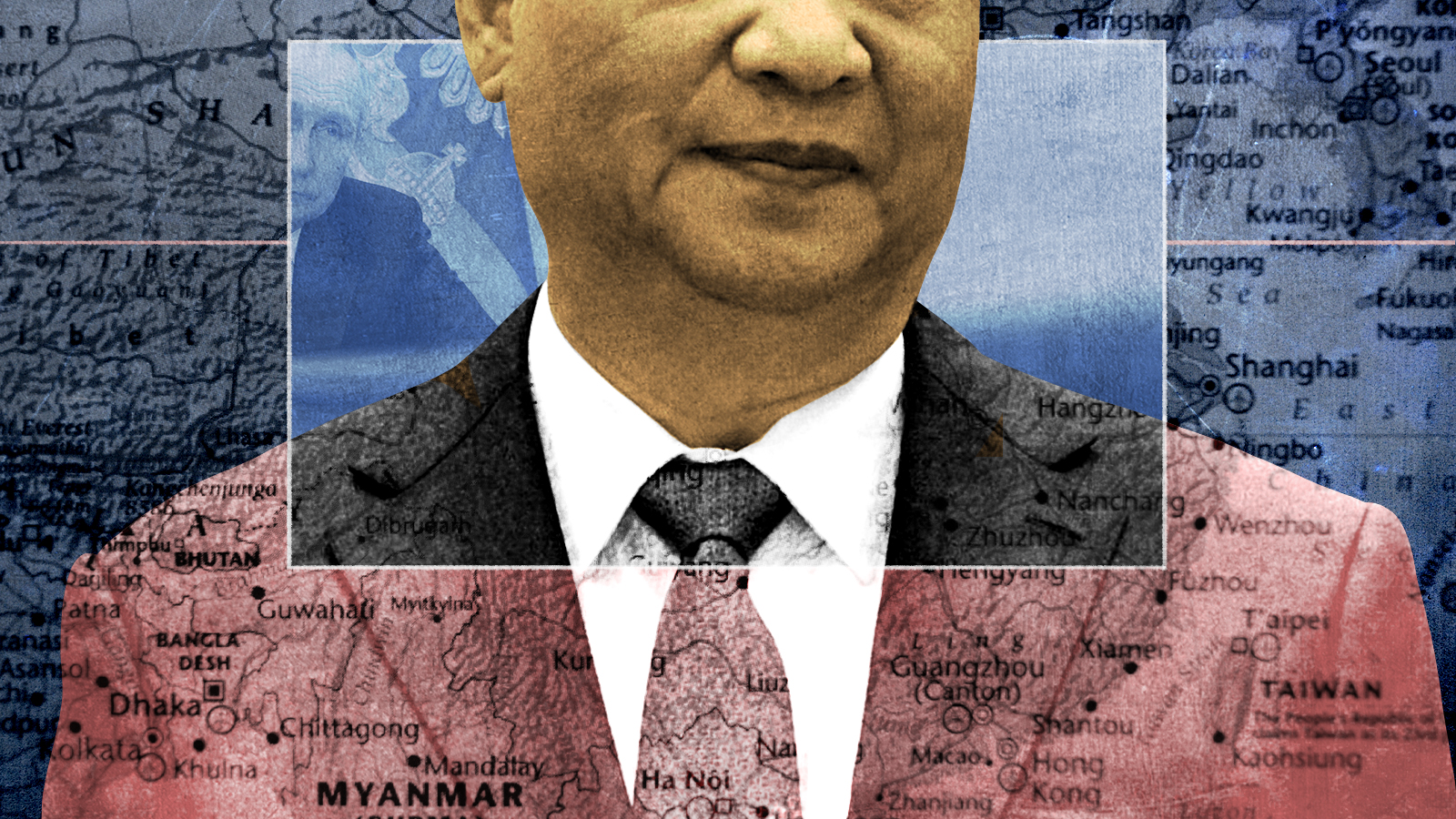Is Beijing paying attention to Russia's faceplant in Ukraine?
Russia's bungled invasion should have China rethinking its reunification ambitions


A free daily email with the biggest news stories of the day – and the best features from TheWeek.com
You are now subscribed
Your newsletter sign-up was successful
As Russian President Vladimir Putin's capricious and poorly planned invasion of Ukraine stalls out due to unexpectedly stiff resistance and bungled logistics, a message is being sent beyond Moscow: Territorial conquest is no cakewalk. And you can be sure that, perhaps more than anyone else outside of Europe, policymakers in China and Taiwan are paying very close attention to Russia's struggles.
Putin reportedly expected a multi-pronged, lightning advance to precipitate the fall of Ukrainian President Volodymyr Zelensky within days. Instead, Russian forces have been so far incapable of seizing the large Ukrainian cities of Kharkiv and Kyiv and have resorted instead to increasingly brutal and indiscriminate attacks on civilian areas. Worse for the Russian strongman, though, are the reports of besieged supply lines, poorly maintained equipment, and low troop morale that have made the once-unthinkable possible: Outright defeat at the hands of Ukraine, whose military forces have made the most of their defensive advantage, deploying drones, anti-tank, and anti-aircraft munitions to devastating effect.
Moscow's options are dwindling. To consolidate control of Ukraine would require the ongoing application of bloody brute force against urban areas, likely sending most surviving Ukrainians into exile. The international community would never recognize Moscow's sovereignty over Ukraine or any puppet regime installed by Putin. At this point, the best gambit for the Kremlin is likely a negotiated settlement that recognizes Russian control of the Eastern provinces of Luhansk and Donetsk as well as the 2014 annexation of the Crimean Peninsula. It all goes to show that interstate war between relatively modernized militaries has been quite rare in the post-Cold War period, and Russia is learning some unpleasant lessons about the nature of 21st-century warfare.
The Week
Escape your echo chamber. Get the facts behind the news, plus analysis from multiple perspectives.

Sign up for The Week's Free Newsletters
From our morning news briefing to a weekly Good News Newsletter, get the best of The Week delivered directly to your inbox.
From our morning news briefing to a weekly Good News Newsletter, get the best of The Week delivered directly to your inbox.
How worried should Chinese President Xi Jinping be that an attempt to reclaim what he considers the breakaway province of Taiwan might result in something similar to Russia's catastrophe in Ukraine? In recent years, China has ramped up its preparations for an amphibious assault on Taiwan by embarking on an expensive retooling and expansion of its armed forces. Stanford University's Oriana Skylar Mastro argues that "Xi wants unification with Taiwan to be part of his personal legacy." The Chinese leader is pushing 70, so the clock is definitely ticking on that one.
Taiwan is a multiparty democracy that has existed in a kind of juridical limbo since Chinese nationalists decamped for the island after their defeat in the Chinese Civil War in 1949. But while leaders on both sides remain publicly committed to the idea that Taiwan is a part of China, Beijing's broken promises and newfound determination to extinguish Hong Kong's unique political system have only served to harden attitudes in Taiwan about mainland China and the potential for peaceful unification. At some point, all of the contradictions inherent in relations between China and Taiwan are likely to come to a head.
The U.S. maintains a "One China policy" that acknowledges Beijing as the legitimate government of China, and does not officially recognize Taiwan as an independent country. Simultaneously, the U.S. has committed itself to the island's defense without a formal treaty, practicing a so-called "strategic ambiguity" that allows Washington to serve as Taipei's arms dealer and protector even while maintaining the pretense that it does not support the island's independence. If you see shades of America's inscrutable level of commitment to Ukrainian sovereignty here, you're not alone.
China clearly anticipates U.S. involvement in any armed conflict over Taiwan, and its military planning aims for victory no matter what Washington chooses to do. But Russia's thus-far dreadful performance in Ukraine should further give them pause. Putin's military hasn't engaged a truly capable adversary in the post-Cold War period, and it shows. Similarly — as Yan Xuetong noted recently for Foreign Affairs — China "has not been involved in a shooting clash since 1989 and has not fought a real war since 1979."
A free daily email with the biggest news stories of the day – and the best features from TheWeek.com
Shaking that dust off involves more than just planning and training. In Ukraine, Russia's inexperience in taking on a reasonably equipped adversary defending its own turf showed almost immediately. Boston University political scientist Rosella Cappella Zielinksi, an expert on war financing and costs, told me that "one big lesson is to not underestimate an untested military as Russia and others did with Ukraine." Taiwan has never fought an interstate war and assumptions about how its forces would perform certainly look shakier than they did a month ago.
Just as Russia's forces numerically dwarf Ukraine's, China has a titanic edge over Taiwan on paper. But as invaders, Chinese troops might face similar issues of morale and purpose — most Taiwanese, after all, speak the same language as those on the Chinese mainland. More importantly, Taiwan's military is well supplied and would be highly motivated to defend the country's identity and democracy against an existential threat.
Does Ukraine's staunch resistance mean that China will now be less likely to try to reunify by force? If they come to believe that Taiwan might have a similar defensive advantage to that enjoyed by Kyiv, maybe so. In international relations, "offense-defense balance theory" suggests that war is more likely when offensive modes of warfare have an advantage over defensive modes. The rapid U.S. victories over Iraq in 1991 and 2003 — one of the few interstate wars in recent years by which to gauge that balance — may have given military planners the false impression of offensive dominance. In reality, the U.S. victories were largely produced by the qualitative and quantitative inferiority of Iraqi military forces, which even in the early 1990s were generations behind America's. Ukraine's ability to hold off the numerically and qualitatively superior Russian military suggests that, at least for now, well-supplied defenders might have a significant edge.
CIA Director William Burns claimed last week that Chinese officials have been "surprised and unsettled" by Russia's failures in Ukraine. Across the Taiwan Strait, leaders in Taipei are scrutinizing the conflict, too, and likely becoming more hopeful about their ability to defend the island with appropriate investments in the kinds of weapons and tactics that have halted the Russian advance in Ukraine. For all the pointless suffering and destruction that Putin has unleashed on his neighbor, his folly might make war over Taiwan less likely, help diminish growing tensions between Washington and Beijing, and discourage a new wave of interstate aggression.
If I were him, though, I wouldn't wait for a thank you card.
David Faris is a professor of political science at Roosevelt University and the author of "It's Time to Fight Dirty: How Democrats Can Build a Lasting Majority in American Politics." He's a frequent contributor to Newsweek and Slate, and his work has appeared in The Washington Post, The New Republic and The Nation, among others.
-
 Tourangelle-style pork with prunes recipe
Tourangelle-style pork with prunes recipeThe Week Recommends This traditional, rustic dish is a French classic
-
 The Epstein files: glimpses of a deeply disturbing world
The Epstein files: glimpses of a deeply disturbing worldIn the Spotlight Trove of released documents paint a picture of depravity and privilege in which men hold the cards, and women are powerless or peripheral
-
 Jeff Bezos: cutting the legs off The Washington Post
Jeff Bezos: cutting the legs off The Washington PostIn the Spotlight A stalwart of American journalism is a shadow of itself after swingeing cuts by its billionaire owner
-
 What is ‘Arctic Sentry’ and will it deter Russia and China?
What is ‘Arctic Sentry’ and will it deter Russia and China?Today’s Big Question Nato considers joint operation and intelligence sharing in Arctic region, in face of Trump’s threats to seize Greenland for ‘protection’
-
 Is the Chinese embassy a national security risk?
Is the Chinese embassy a national security risk?Today’s Big Question Keir Starmer set to approve London super-complex, despite objections from MPs and security experts
-
 Did Trump just end the US-Europe alliance?
Did Trump just end the US-Europe alliance?Today's Big Question New US national security policy drops ‘grenade’ on Europe and should serve as ‘the mother of all wake-up calls’
-
 Taiwan eyes Iron Dome-like defence against China
Taiwan eyes Iron Dome-like defence against ChinaUnder the Radar President announces historic increase in defence spending as Chinese aggression towards autonomous island escalates
-
 Why did the China spying case collapse?
Why did the China spying case collapse?Today’s Big Question Unwillingness to call China an ‘enemy’ apparently scuppered espionage trial
-
 What will bring Vladimir Putin to the negotiating table?
What will bring Vladimir Putin to the negotiating table?Today’s Big Question With diplomatic efforts stalling, the US and EU turn again to sanctions as Russian drone strikes on Poland risk dramatically escalating conflict
-
 The mission to demine Ukraine
The mission to demine UkraineThe Explainer An estimated quarter of the nation – an area the size of England – is contaminated with landmines and unexploded shells from the war
-
 How will the MoD's new cyber command unit work?
How will the MoD's new cyber command unit work?Today's Big Question Defence secretary outlines plans to combat 'intensifying' threat of cyberattacks from hostile states such as Russia
